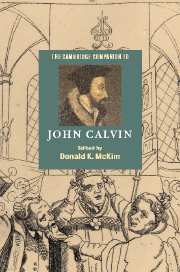Book contents
- Frontmatter
- Part I Calvin’s Life and Context
- Part II Calvin’s Work
- 3 Calvin’s writings
- 4 Calvin as a biblical interpreter
- 5 Calvin’s theology
- 6 Calvin’s ethics
- 7 Calvin’s preaching
- 8 Calvin on piety
- 9 Calvin and social-ethical issues
- 10 Calvin and political issues
- 11 Calvin’s controversies
- Part III After Calvin
- Part IV Calvin Today
- Select bibliography
- Index
10 - Calvin and political issues
from Part II - Calvin’s Work
Published online by Cambridge University Press: 28 May 2006
- Frontmatter
- Part I Calvin’s Life and Context
- Part II Calvin’s Work
- 3 Calvin’s writings
- 4 Calvin as a biblical interpreter
- 5 Calvin’s theology
- 6 Calvin’s ethics
- 7 Calvin’s preaching
- 8 Calvin on piety
- 9 Calvin and social-ethical issues
- 10 Calvin and political issues
- 11 Calvin’s controversies
- Part III After Calvin
- Part IV Calvin Today
- Select bibliography
- Index
Summary
As a theologian and pastor, Calvin addressed political ideas and issues more from necessity than from direct inclination or intention. The proper relationship of the church to civil government inevitably became a major concern for each of the reformers. So Calvin was obliged to work out, at least in outline form, the foundational political ideas he perceived to be generated by Holy Scripture. Calvin's chapter “On Civil Government” from the last book of his Institutes of the Christian Religion remains his most explicit statement. But just as important for seeing fully his framework for thinking politically are his earlier pages on issues of church polity, his earlier chapter “On Christian Freedom,” his extensive commentaries on scriptural references to political questions, and, of course, his many tracts and letters.
By exploring these various sources,we can form some coherent answers to the following key political questions: (1) What is the source and justification for civil government among human beings? (2) What is the purpose and proper role of civil government? (3) How ought civil government accomplish its rightful aims? and (4) Under what circumstances, if any, might Christians under government properly disobey or resist that government?
- Type
- Chapter
- Information
- The Cambridge Companion to John Calvin , pp. 173 - 187Publisher: Cambridge University PressPrint publication year: 2004
- 15
- Cited by

